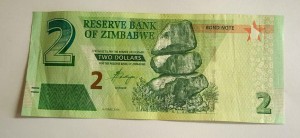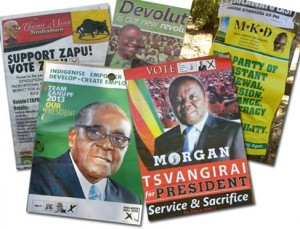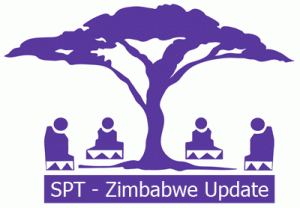Tinashe Nyamunda analyses the Reserve Bank of Zimbabwe’s efforts to address the liquidity shortage in the country.

Zimbabwe $2 Bond Note
Zimbabwe’s export incentive scheme was introduced to encourage exports and address the liquidity crunch in the country. If, for example, tobacco exporters accept bond notes, they receive a five percent incentive in addition to their export earnings. But in a country with a serious shortage and rationing of foreign exchange, accepting bond notes whose value against the US dollar is uncertain in the immediate-to-long term is not really a choice. Barely a month after the initial introduction of the infamous bond notes under the so-called “export incentive scheme,” the Reserve Bank of Zimbabwe (RBZ) has disbursed more bond notes currency into Zimbabwe’s financial system. On 28 November 2016, the RBZ introduced $10 million, followed by a further $7 million and $12 million barely a month later, bringing the full amount in circulation to $29 million. Fully aware of predictions that the introduction of bond notes would result in hyperinflation, the RBZ has resorted to disbursing the pseudo currency on a “drip feed” basis. Contrary to earlier popular belief that bond notes would immediately trigger hyperinflation, their slow introduction has not even resolved the cash shortages. But does this translate to a proper management of currency emanating from fears of hyperinflation? What follows is my opinion on what bond notes have meant for the Zimbabwean economy in the first month of their introduction and their possible long term legacy. ...Read more
Sun, January 1 2017 » Economy, Zimbabwe Update » Leave a comment
Brian Raftopoulos, Director of Research Solidarity Peace Trust.
Introduction
Since the 2013 elections the convulsions within the ruling party have intensified to unprecedented levels. In response to this phenomenon there has been a good deal of analytical commentary on these struggles, focusing on the nature and causes of the contestations and centring mainly on the central question of Presidential succession. 1 Common to all the analyses is the challenge of stabilising and democratising the Zimbabwean state by dealing both with the legacies of colonial period and their continuities, as well as their new iterations, in the post-colonial era. This is not a problem peculiar to Zimbabwe, and in different forms continues to haunt the state in post-colonial Africa, as it is forced to contend with the legacies of both structural inequalities and despotic forms of rule. 2
In Zimbabwe this problem has manifested itself in a centralised, authoritarian ruling party that has conflated its operations with that of the state and overseen the erosion of the capacity of state structures to deliver to and protect the broader citizenry. In the rural areas the state has entrenched its power bases through a combination of coercion, a failure to democratise ‘traditional’ structures and the increasing placement of these under state/party control. Importantly, this consolidation of control in the countryside has also been the result of the delivery of land, with all its attendant problems, through the fast track land reform process. In the urban areas Zanu PF’s control over peri-urban land politics is linked to its undermining of the opposition’s tenuous control of certain urban local government structures and has furthered the reach of Zanu PF’s structures of power and patronage. 3 Read more
Thu, June 9 2016 » Zimbabwe Update » 1 Comment

By Brian Raftopoulos
As Zimbabwe’s elections on 31 July approach, the Southern African Development Community is under pressure to complete its mandate from 2007.
In September 2008 the three major political parties in Zimbabwe entered an inclusive government following a contested election in June that year. The Global Political Agreement (GPA), as it was called, was facilitated by the Southern African Development Community (SADC), and the facilitation was led by the South African government.
After nearly five years under a very problematic and intensely contested inclusive arrangement, the people of Zimbabwe face another election on the 31st July in a battle for the presidency, parliament and council representatives. The setting of the election date was announced unilaterally by President Mugabe, following a decision by the constitutional court clearly directed by Mugabe’s party. Read more
Mon, July 29 2013 » 2013, Elections, Zimbabwe Update » Leave a comment
 By Brian Raftopoulos
By Brian Raftopoulos
Introduction.
Four years after the signing of the SADC facilitated Global Political Agreement in Zimbabwe, the outcome of the process remains fiercely contested and in the balance. The Agreement, which set out to prepare the political process for a generally acceptable election after the debacle of 2008, has been marked by severe ebbs and flows, all too characteristic of the battle for the state that has constituted the politics of the GPA. At almost every stage of the mediation from 2007 and the implementation of the GPA from February 2009, intense conflicts over the interpretation of the accord have left their debris on the political terrain, at the heart of which has been the struggle over the meaning of ‘sovereignty’. Around this notion Zanu PF in particular has woven dense layers of political discourse combined with the coercive force of the state that it continues to control. The major aim of this strategy has been to manipulate and stall the reform provisions in the GPA, and to regroup and reconfigure its political resources after plunging to the nadir of its legitimacy in the 2008 electoral defeat. Read more
Mon, October 22 2012 » Constitution, Zimbabwe Update » Leave a comment






